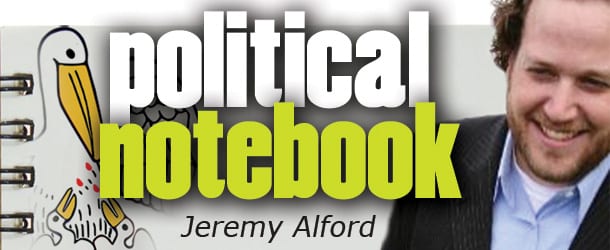By Jeremy Alford and Sarah Gamard
Lawmakers, administration officials, lobbyists and other government relations professionals are working under the assumption that the next special session of the Legislature will be called some time after Feb. 14, 2018.
Louisiana residents who are up-to-speed on next year’s cultural calendar already know that date as Ash Wednesday, or the official end to Mardi Gras.
That’s the time frame — some time in late February, after the carnival season quiets down — that Gov. John Bel Edwards has mentioned as a possibility in several meetings.
But, like all things that radiate from the tall, pointy, Alabama limestone building located in downtown Baton Rouge, there are caveats. Edwards is said to be looking for a true consensus on something — anything — that the House can get behind, his administration can live with and the Senate can stomach.
The governor has already said he has no intentions of calling lawmakers into an unnecessary session if gridlock is the predictable by-product.
The promise of a compromise, however, could prompt Edwards to call a special session to tackle what he describes as the “fiscal cliff” of 2018. That’s when a budget gap of more than $1 billion will materialize due to the expiration of temporary taxes. A compromise would save lawmakers from undertaking what would be a highly emotional special session in the wake of a regular session in which a budget would have to be balanced against the so-called fiscal cliff.
The 2018 regular session is scheduled to convene on March 12.
LABI Getting A Super PAC
It was only a matter of time.
The Louisiana Assoc. of Business and Industry is engineering a new super PAC to accept unlimited donations ahead of the 2019 election cycle.
This breed of political action committee, recently permitted by the U.S. Supreme Court, is still somewhat new in Louisiana, but has quickly taken hold over the last few years.
“This is essentially the new normal and where things are,” said LABI PAC director John Diez. He added that the association was creating a framework “where we go after bigger dollars and conduct some independent expenditures.”
LABI still intends to maintain its four regional PACs, which are expected to go from “little PAC” status to “big PAC” status sometime next year, Diez said on the latest episode of The LaPolitics Report podcast.
That means maximum contributions from the individual PACS (North, South, West and East) could jump from $2,500 to $5,000 for the coming legislative cycle.
Ahead: Redistricting
There may be a touch of momentum surrounding the redistricting conversation in Louisiana even though the process is still a few years away.
Redistricting takes place every 10 years, following the U.S. Census. It’s the way lawmakers adjust election districts to address changing population trends. The next Census will take place in 2020.
Planning is now underway for a statewide summit on the issue. A bipartisan slate of current and former elected officials has agreed to take part, although names and details have not yet been released. An announcement of a 2018 meeting date and a major institutional partner for this effort is coming soon.
Late last year, LaPolitics published a story about the formation of an organization called Fair Districts Louisiana, which could dovetail with these recent rumblings. Also, the U.S. Supreme Court heard oral arguments recently in a Wisconsin case, Gill v. Whitford, that could potentially alter the way state legislatures draw districts.
Lawmakers Review Protected Money
State lawmakers recently kicked off a new budget process that will eventually place hundreds of dedicated funds beneath a legislative microscope.
Some involved with the process believe unlocking Louisiana’s protected funds could make it easier for the Legislature to balance spending and address fiscal emergencies.
It’s a perennial topic at the Capitol; as universities and hospitals have seen their budgets cut, and lawmakers have been barred from dipping into a variety of dedicated funds that could have helped ease the pain.
Members of the Dedicated Fund Review Subcommittee will be reviewing 50 funds at a time in the coming weeks and months in the hopes of inspiring some legislation for the spring.
There is a total of $1.4 billion sitting in special funds that are controlled by the state and also statutorily protected. There’s another $2.5 billion in a set of constitutionally protected funds.
Sen. Sharon Hewitt, R-Slidell, and Rep. Rick Edmonds, R-Baton Rouge, are serving as co-chairs of the subcommittee, which, on an organizational chart, would be placed underneath the Joint Legislative Committee on the Budget.
The rest of the subcommittee includes Sens. Conrad Appel, R-Metairie, Norby Chabert, R-Houma, and Francis Thompson, D-Delhi; House Speaker Taylor Barras, R-New Iberia; and Reps. Beryl Amedee, R-Houma, Larry Bagley, R-Stonewall, Lance Harris, R-Alexandria, and Pat Smith, D-Baton Rouge.
Hewitt, who tried last session to eliminate such funds, said lawmakers will look at each objectively before determining whether it should remain funded. She suspects some of the funds will be “no-brainers to un-dedicate,” while others will be more of a challenge.
The funds to be reviewed are being grouped by department. The Dept. of Wildlife and Fisheries and the Dept. of Transportation and Development were up first.
“It’s a heavy lift because, of course, for every entity that has a dedicated fund, they are against un-dedicating the money,” she said.
Edmonds added lawmakers will at the very least end up with a better understanding of why certain funds exist.
For now, it appears as if participating lawmakers have little interest in touching high-profile pots of money, like the Transportation Trust Fund and the Minimum Foundation Program. But there isn’t a quota or even a goal for how much the subcommittee ultimately wants to tackle.
“We really won’t know what we’re diving into until (later in the process),” Edmonds said.
Hewitt added, “If we don’t make progress on this this year, then I’m going to challenge my colleagues to quit using dedicated funds as an excuse as to why we can’t better manage our budget.”
Political History: When The Majority Leader Vanished
Oct. 16 marked the 45th anniversary of the strange disappearance — and presumed death — of U.S. House Majority Leader Hale Boggs of Louisiana.
Boggs was last seen on Oct. 16, 1972, boarding a twin-engine Cessna 310 that was making its way from Anchorage to Juneau. He was joined by the pilot, Alaska Congressman Nick Begich and Begich’s aide.
Boggs was on his way to speak to a group of Democrats at a fundraising dinner. At the age of 58, he had served 28 years in Congress, and was expected to move up to House speaker around the time his plane disappeared.
The New York Times offered this brief overview of his life the following day:“Mr. Boggs was first elected to Congress in 1941, and, at 26, was the youngest Democrat in the 77th Congress. He was defeated for re-election two years later and joined the Navy, serving for four years. He returned and was elected to the House in 1946. He became the House whip in 1956 and majority leader in 1971. Throughout his 14 terms in Congress, Rep. Boggs has tended to support liberal domestic legislation and voted for the Civil Rights Act of 1964, a move that did not increase his popularity with some constituents.”
Many forget, but Boggs was also a member of the Warren Commission, which President Lyndon B. Johnson created to investigate the assassination of John F. Kennedy.
Boggs was still re-elected in the month following his disappearance, even though he was presumed dead.
Graves: ‘Cajuns Are Endangered’
In early October, Congressman Garret Graves, R-Baton Rouge, offered an amendment in the Natural Resources Committee to designate Cajuns as endangered under the Endangered Species Act of 1973.
Why? Because the “federal government has been mismanaging the Mississippi River system for years, and it has caused the greatest coastal wetlands loss on the North American continent,” according to verbiage from Graves’ office.
A video of the exchange shows Graves smiling while making the push.
“If being an endangered species actually affords you additional protections and allows your habitat to be protected and restored, that’s what we want,” Graves told the committee, adding, “I don’t understand how animals get better protection than our people.”
“I understand,” Chairman Rob Bishop of Utah said with a laugh. “You sure you don’t want to call them an invasive species since from they’re from Canada?”
“The Cajun people were thrown out of Nova Scotia,” Graves responded, on the fly, “and came to the United States before Utah became a state.”
Bishop later injected, “If you really cared about them, why would you put them under the Endangered Species Act? It doesn’t save anything else.”
Graves, of course, eventually withdrew his amendment from consideration.
AG’s New Chief Of Staff
Lynnel Ruckert, the former chief of staff to U.S. House Majority Whip Steve Scalise, R-Jefferson, has been hired by Attorney General Jeff Landry for his team in Baton Rouge. Ruckert has joined the state Justice Dept. as director of administrative services. In this role, she will be responsible for coordinating the department’s budget, legislative affairs, planning and performance.
Liz Murrill has for some time been balancing two full-time roles as solicitor general and administration services director. But she’ll be able to hand the latter title over to Ruckert, whose pay will be funded from within the department’s budget. Meanwhile, Bill Stiles will continue to serve as the chief deputy attorney general.
The addition of Ruckert, according to a spokesperson, will allow Murrill to focus solely on the “significant, complex litigation” before the department. Attorneys there are currently defending “five abortion lawsuits, a criminal case at the U.S. Supreme Court and a Dept. of Corrections challenge to its grooming policies. Additionally, Solicitor General Murrill — working with Chief Deputy Stiles — is actively working on a number of federal and state policy matters.”
They Said It
“We have a wheel barrel full of needs and a thimble-full of money.”
— State Transportation Secretary Shawn Wilson, in The Advocate
“He’s gonna hook it up to some goliath grouper, and he’s gonna surf it across the Gulf of Mexico.”
— Congressman Garrett Graves, R-Baton Rouge, on what the first-place winner of his red snapper photo contest will do with his new kayak
“I don’t like traffic cameras. In fact, I hate them. But that doesn’t mean I can break the speed limit and run red lights to get to a New Orleans Saints game.”
— U.S. Sen. John Kennedy, suggesting New Orleans Mayor Mitch Landrieu was ignoring immigration laws
“It certainly gives me heartburn.”
— Secretary of State Tom Schedler, on the $6-million price tag of statewide elections, on WAFB-TV.
For more Louisiana political news, visit www.LaPolitics.com or follow Jeremy Alford on Twitter @LaPoliticsNow.














Comments are closed.